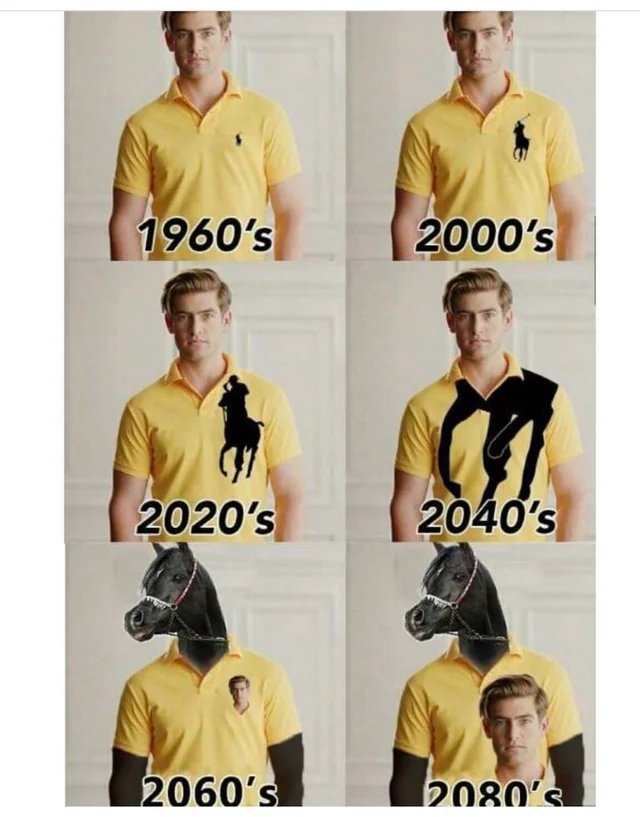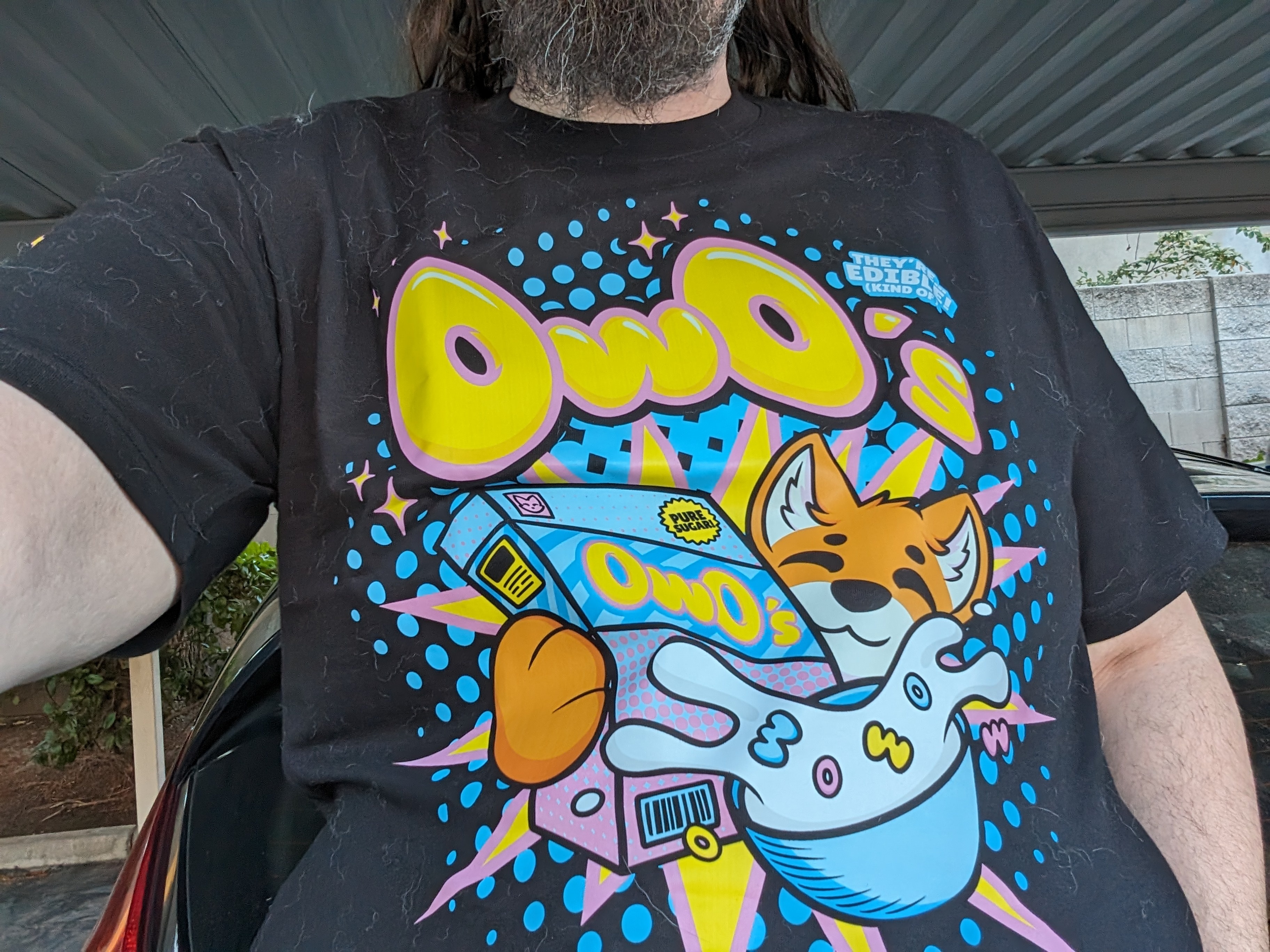- cross-posted to:
- streetwear@lemmy.world
- cross-posted to:
- streetwear@lemmy.world
But how can you show them that you bought an overpriced shirt made by a child in Bangladesh?
Screenprint the notice right on the shirt: this shirt supports Bangladeshi child welfare
Kinda makes everyone else jerks if they’re buying clothes from makers who could afford their next meal regardless.
The problem is it’s hard to hold people accountable for their actions because the liberal court system doesn’t allow for it. As a fellow sigma, I don’t let anyone walk all over me anymore, learned that the hard way after my wife cheated on me and took the kids. I once bought a shirt from Facebook marketplace and it had a rip in it, I sued the seller for 10 million USD in damages, didn’t win the court case. When I tried to get the money back he refused to give me it in Monero. This country is screwed.

Trick yourself out until you look like a NASCAR
Wait… Is that 2020s really what it looks like now?! Or is the meme just 5 years old?
I have several polo Ralph Lauren clothing items in my home, the logo hasn’t changed significantly in 30+ years in shape or size on the normal polos. They do have some items that have the polo logo or the teddy bear larger but those are in the main Ralph Lauren line for fashion, not the Polo line polo shirts that are a business casual intent
I want a divorce
Because you look like a horse.
I can dig the 2040’s.
But of an un branded vibe to it too.
lol yeah
Wow how has that guy been able to look the same during all those years
I always make car dealers take their own sticker or badge off of any vehicle I buy. I usually offer to keep the advertising in place, in exchange for a discount, but they never take me up on it.
I make removal of any dealership branding a condition of purchase.
Hell yeah, brandalism is already too pervasive and just kind of accepted. Good on you.
Funny to see this, because I haven’t bought a vehicle in a long time, but I had the EXACT same thought.
I grimace every time I see that hideous “CarMax - - -” decal stuck to the actual car body.
Same with license plate frames that are like “Huge ‘Dicky’ Richard’s Auto Circus Emporium Honda Jeep Lexus - We rub you right!”
At least those just tell me “the driver is likely lazy or can’t identify a screwdriver.” But an actual decal? Yeah they better take it off, and discount me if they scratch it in the process. :p
Obnoxious, man.
At least they aren’t riveting badges onto cars anymore I’ve heard that used to be super common during the 60s and 70s Personally I hate how my 56 bel air has a AAA of Syracuse screwed into the bodywork of my trunk so even if I remove it there’s still going to be a hole in my trunk so I’m personally pretty glad all this branding today are just decals and stickers that can easily be removed with a eraser wheel or plastic blades
Woah that’s particularly egregious! I’m sure it seems like way more trouble than it’s worth, but nowadays maybe it wouldn’t be so hard to replace it with something cool. :)
Like a metal 3D printed badge of some sort or something creative.
I’m sure glad they don’t do that anymore though. The entitlement of forcing customers to be zombie advertisers is so disgusting.
Absolutely. I always shake my head when I get behind a sharp looking vehicle and it’s ruined by a dealer sticker.
“The Century of the Self” in a nutshell. 😬
The irony is that this is often true. I have always preferred shirts that have minimal advertising on them (preferably none, but a dime sized insignia is generally the best you get) but they are notably harder to find and when you do, they are more expensive. The happy medium I have found is looking for used Polo type shirts that were expensive when new, which I can generally find cheaply because collars aren’t a popular look these days.
You mean blank t-shirts? Because blank t-shirts are usually a lot cheaper than ones with a logo, and most other kinds of shirts I don’t usually see logos on them but maybe we shop in different places. For t-shirts I used to get them from a screen printing vendor because I liked ha ING multiple different colored shirts and they were usually around like 2-3 dollars per shirt depending on the brand
Not bad, but I was mostly referring to brand names, generally with better fabric than just blank t shirts. I have plenty of those shirts that have Pima or other expensive fabrics that I paid $5-20 for a piece used. They are a lot more comfortable, and generally last longer.
My thoughts exactly. I stopped wearing conspicuously branded products when I was in highschool for this very reason.
Yeah, that’s why I won’t wear stuff like that
Now, there’s the adjacent, but not the same thing of band shirts or similar merchandise. The difference is that in theory, the band/artist is going to benefit from the purchase. It is still advertising that I’m paying for, but, because merchandise is often a big income stream for musicians in particular, I don’t object to being their billboard if I like them enough to get anything of theirs in the first place.
When it’s a clothing company? Hell no. If their label/logo is more than the size of a tag, I’m not doing it. I don’t mind the idea of a trademark/label/tag being present, that’s expected. It’s when the branding becomes the design that it’s a problem.
Yeah I’m fond of the “Tshirts that make a statement” thing.
It’s personal expression to say “Hey I’m really into this band and I might’ve gone to this concert!” Could be a conversation starter too, and it supports the band or artist like you said!
But I really don’t understand people walking around with some billboard from a clothing mega-brand. You’re literally paying them to do marketing work for them lol.
I wish this was a thing… All the shirts I’ve gotten in the last few years have been $40-50 and have the brand’s logo on the back near the neckline (they also came with stickers that are advertising the brand). I would usually only spend $5-10 for a shirt, but these are limited prints and most of them are on really good, comfortable shirts. Just look how cool my newest one is:

If I drop fifty bucks on a t-shirt it better come with a bag of weed.
Initially that was the only way you could buy weed in Maine from a delivery service before they allowed recreational dispensaries. $50 T-shirt with a free bag of weed.
Sir, I think there is some t-shirt in your hair
I have two dogs and one is very cuddly. Those are my black shirts within 30 seconds of putting them on. And most of my shirts are black.
They’re Edible (kind of)
🤣
Pure Sugar!
Lol ‘limited’ my ass
They don’t usually print more once they sell out of the initial stock. Hell, Hyena Agenda and Nomad Complex just stopped existing entirely. 😮💨
You paid money for that shirt?
Look if I’m gonna wear brand stuff its gonna be linux
Linus should be paying you for the advertising!
10% off your next Linux purchase.
I think they paid me by letting me use their OS for free. Also, why not talk about something I love to use?
why not talk about something I love
Because capitalism! Nothing has meaning unless you get a monetary value out of it!
I only write this comment because it will get me more only fans subscribers in the long run and one day I can upgrade to selling turbines.
Fuck yeah I love a discount
Every so often, I am willing to pay to advertise.
I just bought a shirt with a vintage PBS logo from the 1980s, which I did not buy from PBS since they aren’t selling it, but I would have paid to advertise PBS from a PBS store if they sold it with the 1980s logo.
So yeah, I pay to advertise public television- and public radio, since I really need an NPR shirt as well. We also give them money every year. And we get back really excellent journalism, so it’s worth it.
Now Nike? Fuck Nike. I’d never wear their fucking swoosh.
Yeah. I’m happy to wear shirts with logos from my favorite bands on them.
Band tees blank shirts and spray painted shirts for me.
The bougie love advertising for free! You know how many yeti stickers I see on cars? It’s a fucking ice chest…
Those Apple stickers. This was in the Bay Area but not that many people work at Apple. Even if they did, who would advertise their employer on their car??
The stickers come free with any of their tech
I’m aware but you don’t need to use them!
They’re stickers.
The universe gets all tensiony if they don’t get stuck on things.
what is “leer” for that matter
Are you referring to seeing “Leer” on the backs of trucks? If so, Leer makes the tonneau covers.
you just used more words I don’t know
The truck bed covers.
still don’t understand why they like to advertise the brand is that like part of their personality? is it the Arch Linux of truck bed covers?
Its a logo applied by the manufacturer.
surely that’s not structurally necessary for its function
It’s Spanish Big Book propaganda.
I prefer to belive this explanation except I always see it on big gas guzzlers and the drivers look like people who don’t read any books in any language
No no you should get paid to wear them
In sociology and in economics, the term conspicuous consumption describes and explains the consumer practice of buying and using goods of a higher quality, price, or in greater quantity than practical. In 1899, the sociologist Thorstein Veblen coined the term conspicuous consumption to explain the spending of money on and the acquiring of luxury commodities (goods and services) specifically as a public display of economic power—the income and the accumulated wealth—of the buyer. To the conspicuous consumer, the public display of discretionary income is an economic means of either attaining or of maintaining a given social status.
This results in what may be known as Veblen goods, for which the demand increases as the price increases, in apparent contradiction of the law of demand, resulting in an upward-sloping demand curve.
The entire principle Apple is based on
Yep that is why I paint my Androids white
I even take the badges off my car. Nobody needs to know what brand I have.
I do, so that when I see your car broken down on the highway I know what not to buy. /j
Adidas products are also produced really cheap due to child labour. So that’s another reason to make those cheaper for customers.
Spoiler alert, most stuff in the fashion industry is chocked full of human rights violations.
Climate Town on Shirts: https://youtu.be/8CkgCYPe68Q
But if I stop buying them, won’t I be putting hundreds of children out of work?
No. The shirts will continue to be made and sent to wholesalers, who then dispose of the finished garments in giant landfills.
Truly the circle of life
Yep. Probably the best thing you’ll do all month.



















